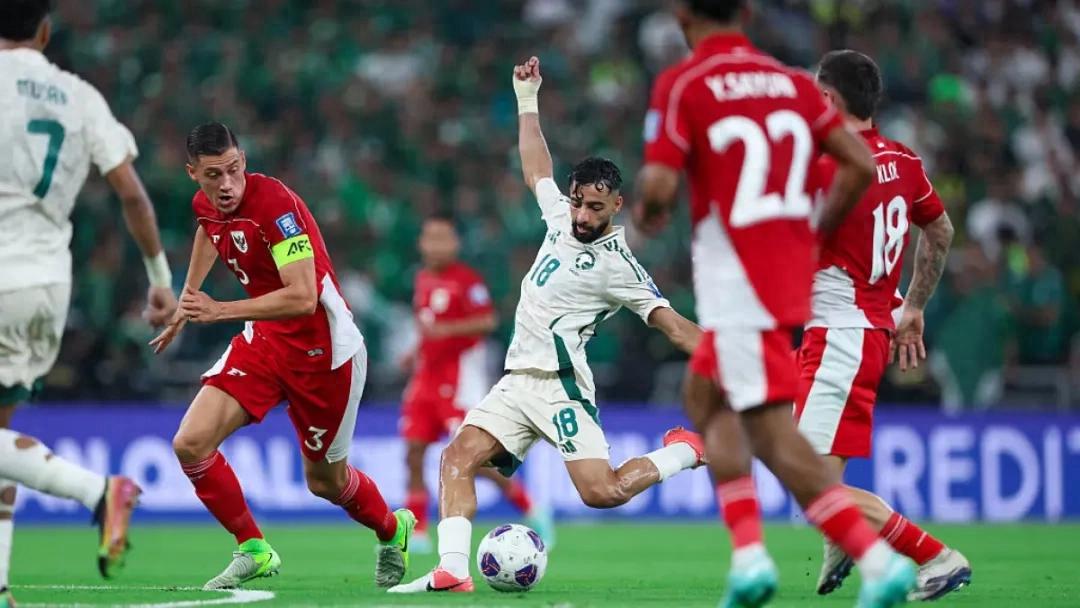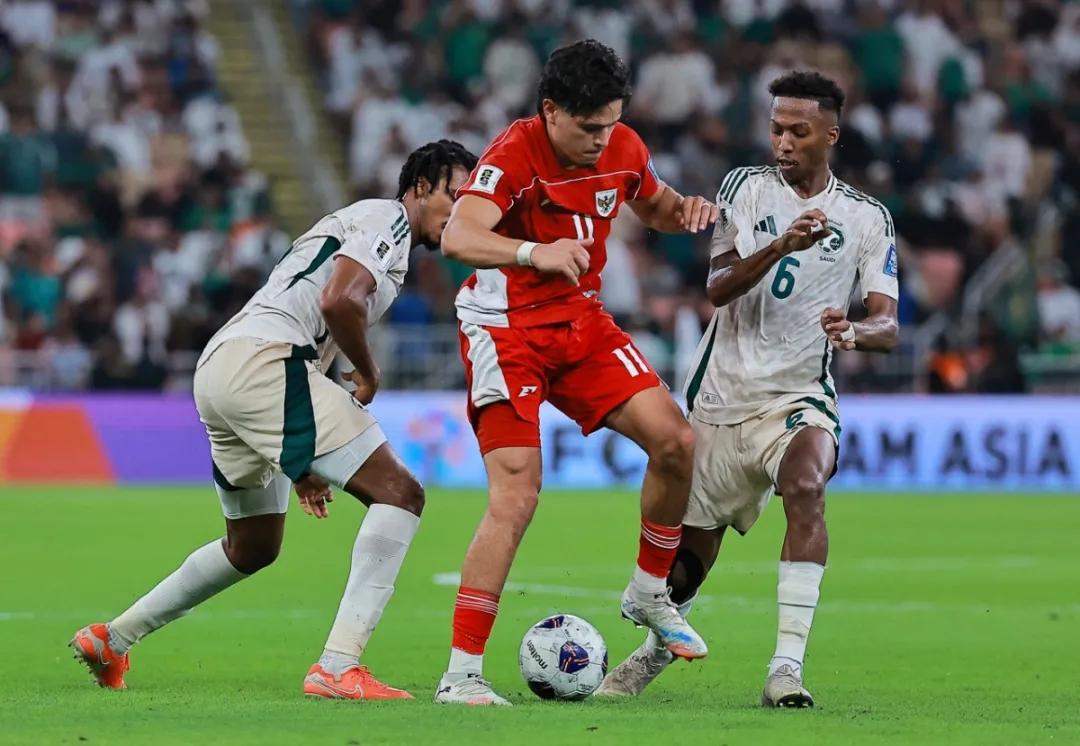Cruyff's hasty tactical changes led to defeat in the first leg of the playoff, with Indonesian media doubting their chances of advancing.

By Han Bing The first round of the Asian World Cup playoff ended with mixed outcomes for the two West Asian teams playing on home soil: Qatar held Oman to a 0-0 draw, missing a chance to take the lead, whereas Saudi Arabia defeated Indonesia 3-2, taking an early lead in the group.
In June, the AFC declared Qatar and Saudi Arabia as hosts for the playoffs, giving them home advantage, which was met with strong objections from the other four participating teams. Although Malaysia, Kuwait, Bahrain, Jordan, and Thailand had all expressed interest in hosting, none were successful. On October 8, before the playoffs began, Oman’s new coach Queiroz criticized the format and schedule as unfair, accusing the AFC of blatantly violating the neutrality principle of the playoffs and favoring Qatar and Saudi Arabia with the schedule: “Are there no suitable stadiums in Japan or Kuwait? Qatar and Saudi Arabia, with home advantage, also have a six-day scheduling edge. I have never seen such an arrangement.”
Before the Indonesia vs. Saudi Arabia match, Indonesia’s coach Cruyff protested the AFC’s appointment of a Kuwaiti referee, who, like Saudi Arabia, is from an Arab country, violating the neutrality rule. However, the protest was ineffective. Despite also playing away and facing an unfavorable schedule, Oman and Indonesia performed very differently. Queiroz’s tactical setup allowed Oman to hold Qatar, coached by Spanish manager Lopetegui, to a stubborn 0-0 draw, gaining some advantage for qualification. Indonesia, however, suffered due to Cruyff’s failed tactical changes, losing a promising early lead. According to Elo Ratings, their chances of advancing dropped to a mere 1% in theory.

The Indonesian Football Association hastily naturalized two Eredivisie forwards, Jonathans (Utrecht) and Zeistra (Volendam), to strengthen the squad, but only eight naturalized players started the match. This was the second-lowest number of naturalized starters in seven matches under Cruyff, only exceeding the seven naturalized players fielded in a September friendly against the weaker Chinese Taipei team.
In September friendlies, Cruyff abruptly switched from a 3-4-3 to a 4-4-2 formation, with all three lines—defense, midfield, and attack—lacking stable partnerships from the previous top 18 squad. Diks paired with Izes as center backs for the first time, though Diks had previously played mostly as a wing-back, and right-back duties were covered by local player Sayuri. Veteran naturalized player Klock, called up for the first time by Cruyff in September, replaced the naturalized defensive midfielder Haye, who had started four matches in the top 18. Strangely, Romeni, who scored decisive goals in the top 18 matches against Bahrain and China, was relegated to the bench.
In the 7th minute, Tambakti committed a handball in the penalty area, and Diks successfully converted the penalty, giving Indonesia a dream start. However, just six minutes later, Klock made consecutive clearance errors in defense, allowing Shammat to score a long-range shot into the corner. At the 30th minute, Sayuri fouled Braikan from behind in the penalty box, and Braikan scored the penalty to put Saudi Arabia ahead. Early in the second half, Sayuti replaced local winger Putra, and Cruyff’s attempt to correct the formation proved unsuccessful. In the 61st minute, Juval’s long shot forced goalkeeper Paes into a fumble, and Braikan scored again on the rebound due to Sayuri’s defensive lapse.

Trailing by two goals, Cruyff finally brought on Haye and Romeni. In the 87th minute, Romeni forced Nawaf into a handball foul, and Diks scored his second penalty. Despite Saudi Arabia’s defensive midfielder Kanu being sent off in stoppage time after two yellow cards for clashing with the referee, the home side still secured the crucial three points. Indonesia suffered a thorough defeat; if not for the crossbar denying goals in the first half and Paes’ outstanding saves blocking Braikan’s close-range header and Salim Dosari’s one-on-one chance in the second half, the loss would have been heavier. Saudi Arabia had 17 shots with 10 on target, including six excellent scoring opportunities, while Paes made seven saves. Without his superb performance, Indonesia’s goals conceded would have been even higher.
After the match, Indonesian media criticized Cruyff’s rash decision to change four starters and the players’ difficulty adapting to the 4-4-2 formation. The team’s key left-back Ferdonk was also sidelined with a muscle tear, worsening the lineup. Indonesia faces Iraq on October 11, who are well-rested, and the media are generally pessimistic. The Indonesian Football Association chairman Tohir still hopes the team can rally, at least to defeat Iraq and secure second place in the group to maintain qualification for the next playoff stage. Saudi Arabia, having taken all three points and enjoying a six-day rest advantage, can adjust tactics based on the Indonesia-Iraq result. However, Indonesia’s unfavorable schedule means that if they fail to beat Iraq in the next round, even a draw will almost certainly eliminate their chances of finishing second in the group.
The playoff format and schedule clearly favor Saudi Arabia and Qatar from the very first match. Of course, the AFC has already given these two hosts a significant advantage, but whether they capitalize on it depends on their own performances.



Wonderfulshortvideo
The Nuno Mendes x Cristiano Ronaldo link-up 😮💨🔗


Harry Kane is the BEST striker Thomas Tuchel has EVER worked with 👀🏴


User esportapi has posted a video.


Cristiano Ronaldo is the


User FieldFrenzy has posted a video.


Air Kvara ✈️


Jamie Gittens that is rude 🤯








 Links
Links
 Contact
Contact
 App
App


